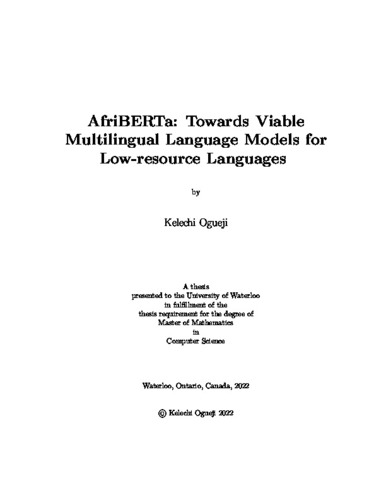| dc.contributor.author | Ogueji, Kelechi | |
| dc.date.accessioned | 2022-08-29 17:13:45 (GMT) | |
| dc.date.available | 2022-08-29 17:13:45 (GMT) | |
| dc.date.issued | 2022-08-29 | |
| dc.date.submitted | 2022-08-19 | |
| dc.identifier.uri | http://hdl.handle.net/10012/18662 | |
| dc.description.abstract | There are over 7000 languages spoken on earth, but many of these languages suffer from a dearth of natural language processing (NLP) tools. Multilingual pretrained language models have been introduced to help alleviate this problem. However, the largest pretrained multilingual models were trained on only hundreds of languages. This is a small amount when compared to the number of spoken languages. While these models have displayed impressive performance on several languages, including those they were not pretrained on, there is a lot of ground to be covered.
A lot of languages are often left out because pretrained language models are assumed to require a lot of training data, which the languages do not have. Furthermore, a major motivation behind these models is that such lower-resource languages benefit from joint training with higher-resource languages. In this thesis, we challenge both these assumptions and present the first attempt at training a multilingual language model on only low-resource languages. We show that it is possible to train competitive multilingual language models on less than one gigabyte of text data containing a selection of African languages.
Our model, named AfriBERTa, covers 11 African languages, including the first language model for 4 of these languages. We evaluate this model on named entity recognition and text classification spanning 10 languages. Our evaluation results show that our model is very competitive with larger multilingual models - multilingual BERT and XLM-RoBERTa - on several languages. Results suggest that our “small data” approach based on similar languages may sometimes work better than joint training on large datasets with high- resource languages. Furthermore, we present a comprehensive discussion of the implications of our findings. | en |
| dc.language.iso | en | en |
| dc.publisher | University of Waterloo | en |
| dc.relation.uri | https://huggingface.co/datasets/castorini/afriberta-corpus | en |
| dc.relation.uri | https://github.com/castorini/afriberta | en |
| dc.relation.uri | https://huggingface.co/castorini/afriberta_large | en |
| dc.subject | natural language processing | en |
| dc.subject | multilingual | en |
| dc.subject | language model | en |
| dc.subject | named entity recognition | en |
| dc.subject | pre-trained language model | en |
| dc.subject | text classification | en |
| dc.title | AfriBERTa: Towards Viable Multilingual Language Models for Low-resource Languages | en |
| dc.type | Master Thesis | en |
| dc.pending | false | |
| uws-etd.degree.department | David R. Cheriton School of Computer Science | en |
| uws-etd.degree.discipline | Computer Science | en |
| uws-etd.degree.grantor | University of Waterloo | en |
| uws-etd.degree | Master of Mathematics | en |
| uws-etd.embargo.terms | 0 | en |
| uws.contributor.advisor | Lin, Jimmy | |
| uws.contributor.affiliation1 | Faculty of Mathematics | en |
| uws.published.city | Waterloo | en |
| uws.published.country | Canada | en |
| uws.published.province | Ontario | en |
| uws.typeOfResource | Text | en |
| uws.peerReviewStatus | Unreviewed | en |
| uws.scholarLevel | Graduate | en |

